#movements against economical inequality
Explore tagged Tumblr posts
Text
सर्वंकष देशहितार्थ लढणे हीच खरी देशसेवा!
0 notes
Text
What Will It Take for Society to Value Its Daughters?
A woman sits in a doctor’s office, staring at an ultrasound. It’s a girl. And in that moment, she makes a decision—not because of financial struggle, not because of health concerns, but because she believes a daughter is not worth having. This isn’t a distant reality. It happens in countries where gender-based abortion is illegal and in those where it isn’t. It happens in places where women have…
#breaking gender stereotypes#breaking the glass ceiling#breaking the patriarchy#changing gender expectations#changing gender perceptions#cultural attitudes toward women#cultural bias against women#cultural sexism#dismantling gender bias#economic impact of sexism#empowering the next generation#Empowering Women#ending gender bias#equal rights movement#equality for women#feminism and equality#feminism vs patriarchy#feminist movement#feminist perspective#financial independence for women#future of women’s rights#gender and society#gender bias#gender bias in families#gender discrimination#gender discrimination statistics#gender disparity#gender equality awareness#gender inequality#gender inequality awareness
0 notes
Text
In 2024, wealth concentration rose to an all-time high. According to Forbes’ Billionaires List, not only are there more billionaires than ever—2,781—but those billionaires are also richer than ever, with an aggregate worth of $14.2 trillion. This is a trend that looks set to continue unabated. A recent report from the financial data company Altrata estimated that about 1.2 million individuals who are worth more than $5 million will pass on a collective wealth of almost $31 trillion over the next decade.
Discontentment and concern over the consequences of extreme wealth in our society is growing. Senator Bernie Sanders, for instance, stated that the “obscene level of income and wealth inequality in America is a profoundly moral issue.” In a joint op-ed for CNN in 2023, Democratic congresswoman Barbara Lee and Disney heiress Abigail Disney wrote that “extreme wealth inequality is a threat to our economy and democracy.” In 2024, when the board of Tesla put to vote a $56 billion pay package for Elon Musk, some major shareholders voted against it, declaring that such a compensation level was “absurd” and “ridiculous.”
In 2025, the fight against rising wealth inequality will be high on the political agenda. In July 2024, the G20—the world’s 20 biggest economies—agreed to work on a proposal by Brazil to introduce a new global “billionaire tax” that would levy a 2 percent tax on assets worth more than $1 billion. This would raise an estimated $250 billion a year. While this specific proposal was not endorsed in the Rio declaration, the G20 countries agreed that the super rich should be taxed more.
Progressive politicians won’t be the only ones trying to address this problem. In 2025, millionaires themselves will increasingly mobilize and put pressure on political leaders. One such movement is Patriotic Millionaires, a nonpartisan group of multimillionaires who are already publicly campaigning and privately lobbying the American Congress for a guaranteed living wage for all, a fair tax system, and the protection of equal representation. “Millionaires and large corporations—who have benefited most from our country’s assets—should pay a larger percentage of the tab for running the country,” reads their value statement. Members include Abigail Disney, former BlackRock executive Morris Pearl, legal scholar Lawrence Lessig, screenwriter Norman Lear, and investor Lawrence Benenson.
Another example is TaxMeNow, a lobby group founded in 2021 by young multimillionaires in Germany, Austria, and Switzerland which also advocates for higher wealth taxation. Its most famous member is the 32-year old Marlene Engelhorn, descendant of Friedrich Engelhorn, founder of German pharma giant BASF. She recently set up a council made up of 50 randomly selected Austrian citizens to decide what should happen to her €25 million inheritance. “I have inherited a fortune, and therefore power, without having done anything for it,” she said in a statement. “If politicians don’t do their job and redistribute, then I have to redistribute my wealth myself.”
Earlier this year, Patriotic Millionaires, TaxMeNow, Oxfam, and another activist group called Millionaires For Humanity formed a coalition called Proud to Pay More, and addressed a letter to global leaders during the annual gathering of the World Economic Forum in Davos. Signed by hundreds of high-net-worth individuals—including heiress Valerie Rockefeller, actor Simon Pegg, and filmmaker Richard Curtis—the letter stated: “We all know that ‘trickle down economics’ has not translated into reality. Instead it has given us stagnating wages, crumbling infrastructure, failing public services, and destabilized the very institution of democracy.” It concluded: “We ask you to take this necessary and inevitable step before it’s too late. Make your countries proud. Tax extreme wealth.” In 2025, thanks to the nascent movement of activist millionaires, these calls will grow even louder.
#it's nice to think about but it's not going to happen anytime soon#not with this congress and president
603 notes
·
View notes
Note
I saw how you said that describing the PRC as capitalist betrays a lack of understanding of capitalism and I actually really liked how well you explained that being against capitalism isn't proper Marxism/communism so I was wondering if you could open that post on understanding capitalism a bit more! Only if you're okay with it, of course!
Eventually I should do a real proper Effortpost on this with all the graphs and figures to really drive home the point that I'm making, but very briefly since it's getting late here:
In Marx's time, capitalism was an emergent societal mode of production that was closely entertwined with the enclosure movement and the industrial revolution. On the level of labor, it saw the decline of peasant and artisan labor and the rise of proletarianization, and with it the tendencies of mechanization and rationalization of production (e.g. de-skilling of manufacturing and measurement of efficiency by the labor-hour)
On a consistent historical level, from Marx's time to ours, capitalism has been characterized by the role of liquidity holders (e.g. banks, joint stock companies, investment funds &c) in investigating growth industries and investing in them for the purpose of greater profit. Notably: the demand from financial actors for returns on their balance-sheets is constant, regardless of the state of the development in any given productive market. Meanwhile the nature of industrial development is that it happens in fits and starts, in great surging advances followed by relatively stagnant plateaus. The results of this mismatch are twofold:
First, as Lenin chronicled, it leads for a demand to engage in imperialist expansion to open new markets and seek new profits that way. The other, arguably larger and more important frontier however is that of speculation. Because the inflation of the value of an asset creates purchasing power in and of itself in the short term, which is maintained on balance sheets so long as the arrears on credit derived on it keeps getting paid on a notional path to amortizaiton.
The tendency in capitalism since Marx's time has been the ever-growing importance of these two dynamics and the gradual receding of the importance of low-elasticity economic activity like manufacturing goods.
The tendency of imperialist expansion within capitalism has created a networked global bourgeoisie throughout the financial capitals of the world who extract rentier profits from the various rural peripheries of the global south, and the speculative nature of investment capital in the late 20th and early 21st century defines the quality of the "capitalist develpment" we see in bourgeois states in the contemporary global south: namely, extremely uneven development between rural and urban, trapping of the labor force in a holding-pattern of low-pay low-skill work such as textile production or low-end manufacturing (e.g. Bangladesh and Malaysia) while their capitals enjoy wealth near that of the imperial core, with relatively very high-paying jobs in the knowledge industries (this should ring a bell with India lol). Any country that is actually ruled by its bourgeoisie will follow this pattern, because financialized paper profits are larger (in nominal terms) than the highly investment-intensive industrial development that has gone on in the PRC under the stewardship of the Party. However the result is that the PRC has relatively low inequality among middle-income countries and the technological benefits of the industrialization led by cities is beginning to flow to rural China, which is what allowed them to lift 800 million people out of extreme poverty, something that has yet to happen in actually capitalist bourgeis states like India.
274 notes
·
View notes
Text
The 4B Movement: How South Korean women are leaving the patriarchy behind
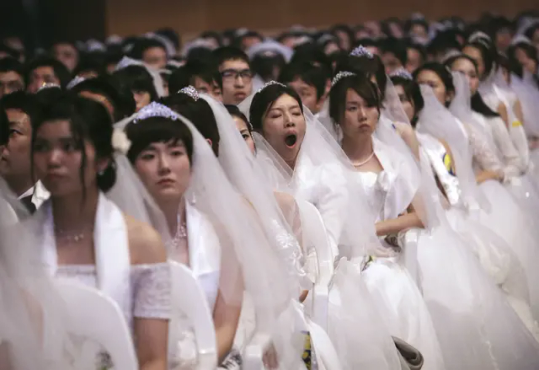
(Getty Images)
In 2016, a 34-year-old man named Kim Sung-min waited inside a unisex restroom outside exit 10 of Gangnam Station, Seoul South Korea. Six different men came and exited through the restroom over the span of an hour, until a 23-year-old woman entered, and Kim proceeded to stab and kill her with a 12-inch-long sushi knife. In court, Kim stated, “I did it because women have always ignored me.” Kim’s actions and thoughts are not out of the ordinary amongst Korean men—violence against women is extremely common in South Korea.
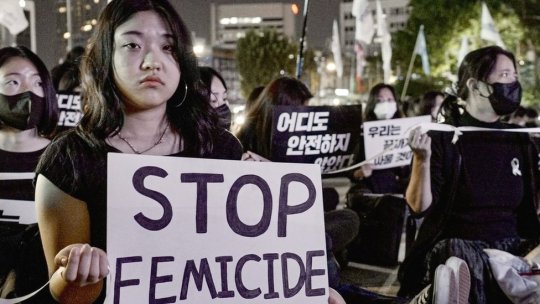
(BBC)
South Korea has a long record of female subjugation. Between 1953 and 2021, abortion was illegal in almost all circumstances, and current law allows a woman to get an abortion only if she has consent from a male relative or her boyfriend/husband/partner. A 2015 South Korean government survey revealed that almost 80% of women had been sexually harassed at work. A survey released by The Ministry of Gender Equality and Family found that 57.8 percent of women felt vulnerable to misogynistic violence. Digital crime and sexual harassment are extremely common— “molka”, up-skirt photos, and secret cameras hidden in restrooms are rampant, so much so that any cellphone purchased in South Korea has a mandatory chime when photos are taken. The World Economic Forum’s 2022 Global Gender Gap Index ranks South Korea at number 99 out of 146 countries for gender equality. Legislation actively works against women trying to report sexual assault. Men accused of stalking or harassment can “ask” their victims to drop charges, and in 2022 a man murdered his former colleague after she refused to drop charges against him for stalking her since 2019. South Korea has the highest gender pay gap of all the OECD countries—the top wealthiest 37 countries, globally, with women earning on average a third less than men. These alarming statistics have come years after the “Gangnam Station” murder, and South Korean women continue to be targeted for their gender.
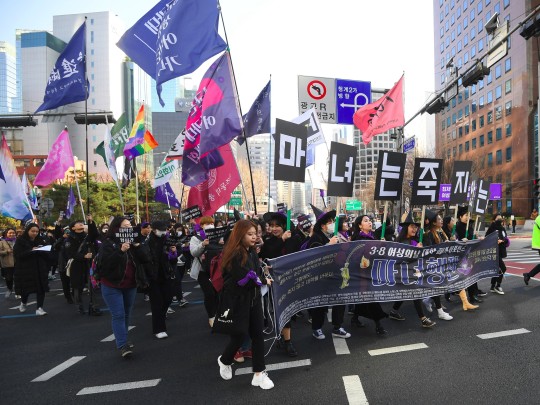
(Jung Yeon-Je/AFP via Getty Images)
Despite Kim’s own testimony, government authorities explicitly denied the misogynistic motive, and the prosecution announced that the case was not being investigated as a hate crime. Kim was eventually sentenced to 30 years in prison. In response to the murder, women took to the streets outside Gangnam station and the surrounding areas in protest. The women, many of whom had never considered themselves feminists or activists, but the nature of the crime and the misogynistic motivation, as well as the court's refusal to acknowledge it, outranged them. The murder incited intense debates about misogyny within the country, and the gender inequities women faced both socially and economically. Five months after the murder, Cho Nam-Joo’s novel Kim Jiyoung, Born 1982 was published. The book devastatingly details an everyday woman’s daily experiences of nonstop sexism, inequality, and misogyny in contemporary South Korea, and served as another enraging eye-opener that would develop into what would become known as the 4B Movement.
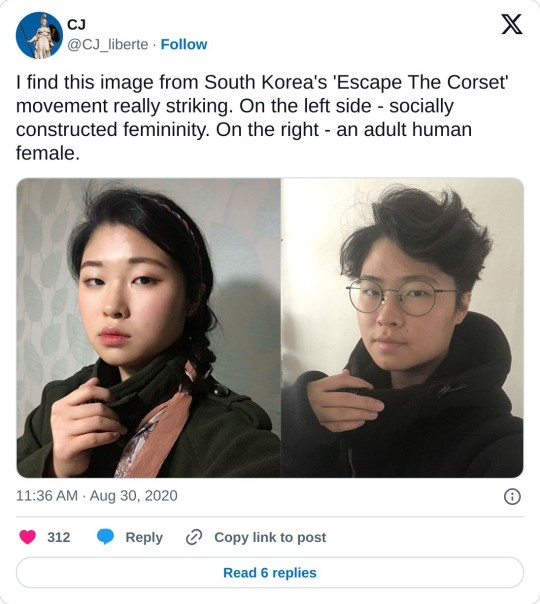
The four B’s (or “Four No’s”) of the movement represent the four major components that women of the movement are rejecting; Bisekseu (sex), Bichulsan (child-bearing), Biyeonae, (dating) and Bihon (marriage). South Korean feminists define the 4B movement not as a fight against the patriarchy, but a complete step away from it— leaving it behind. In 2017, the Escape the Corset campaign swept across the country. The word “corset” is used by Korean feminists as a metaphor for the societal mechanisms that control and repress women, for example, the extreme and toxic beauty standards. Both 4B and Escape the Corset condemn and reject the influence that beauty holds within every aspect of South Korean life. Pioneers such as feminist author Cho Nam-Joo, and photographer Jeon Bo-ra, who photographed women who shaved their heads in rebellion. Social media has played a large role in the 4B movement, with bloggers and beauty influencers like Lina Bae speaking up against unattainable beauty standards and societal pressures, and Summer Lee who was inspired to cut her hair, throw away her hyperfeminine clothes, and post pictures of herself without makeup.
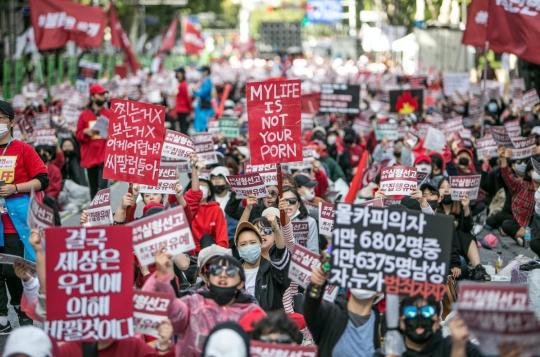
(Jean Chung/Getty Images)
Despite increasing conversation on women’s rights, feminism is still considered a taboo, contentious, or even “dirty” word for many South Koreans. It is often associated with “man-hating” and perceived as overly aggressive. The country's current president Yoon Suk-yeol has promised to close down the South Korean Ministry of Gender Equility and Family, and any other organizations that fund or support women and victims of sexual violence, claiming they “treat men like potential sex criminals”. A January 2023 article in the South Korean newspaper The Sisa Times reported that 65% of women in the country do not want children, 42% do not want to get married, and over 80% of those cite domestic violence as their key reason. As a result, concerns regarding the rising average population age and declining birth rate in South Korea have increased greatly. The country's birth rate is less than one per woman as of 2021, and the country saw less than 200,000 marriages. In recent years, the South Korean government has commissioned a number of soap operas and reality TV shows to promote an idyllic view of romantic heterosexual love, and to encourage marriage and reproduction.

(Yonhap)
The 4B movement and Escape the Corset campaign have had a tremendous impact on the way young South Korean women view the countries cultural grip on women’s appearances and lives. Between 2015-2016 and 2017-2018, Korean women spent over 5 billion Korean Won less on beauty products and cosmetic surgeries, instead investing their money in cars and choosing independence over objectification. The movement is calling for boycotts of any business that uses sexist advertising, and encouraging women to eat at women-owned restaurants, drink in women-owned bars, and shop at women-owned stores—women’s money goes into the pockets of other women. Women’s universities have also been on the rise in South Korea, with most cities housing one or several women-only institutions. Similarly, women’s only spaces have begun to expand, women’s parking spots closer to entrances and exits in parking garages, women’s only hotel floors and common rooms, and women’s only subway cars. These spaces allow feminism to spread and flourish, and give Korean women the ability to find community with other women without the interference of men.
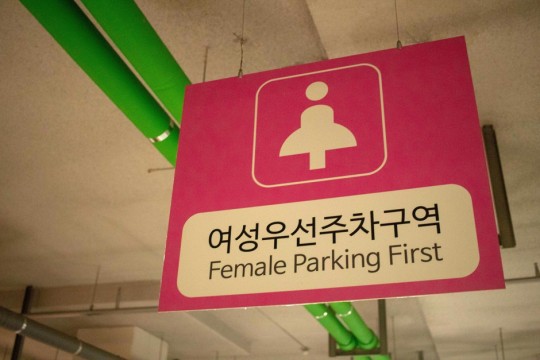
(Ian Baldessari/CityLab)
Since 2016, Exit 10 of Gangnam Station has become a symbolic site for South Korean feminism. The South Korean feminist movement developed out of particularly misogynist conditions within their country. The 4B movement represents a radical way that women have sought to create an online and offline world devoid of men—rather than engaging in arguments and altercations, they simply refuse to interact with men in every aspect of their lives. These actions have had a profound impact on the functionality of South Korean society and have opened an uncloseable door too the discussion of women’s rights.
McCurry, Justin. “Calls for Stalking Law Overhaul in South Korea as Woman’s Murder Shocks Nation.” The Guardian, Guardian News and Media, 23 Sept. 2022, www.theguardian.com/world/2022/sep/23/calls-for-stalking-law-overhaul-in-south-korea-as-womans-shocks-nation.
Teehan, Katie. “What Is the 4B Movement?” Service95, 16 Apr. 2024, www.service95.com/4b-movement-explainer/.
Izaakson , Jen, and Tae Kyung Kim. “The South Korean Women’s Movement: ‘We Are Not Flowers, We Are a Fire.’” Feminist Current, 16 June 2020, www.feministcurrent.com/2020/06/15/the-south-korean-womens-movement-we-are-not-flowers-we-are-a-fire/.
Lee, Min Joo. “Why so Many South Korean Women Are Refusing to Date, Marry or Have Kids.” Yahoo! News, Yahoo!, 15 May 2023, news.yahoo.com/why-many-south-korean-women-123250959.html?guccounter=1&guce_referrer=aHR0cHM6Ly93d3cuZ29vZ2xlLmNvbS8&guce_referrer_sig=AQAAAHmBVorK4v6bdzwcJMRyRdXkKtzUlpQYWn5Ot-BPzs-YRNNZFW5JBwC65OTaPrRImn3F3G56r0gfNydadUzlQtPS61hOi6uggk_OkwZqqvLvS-YN4HbPrpwKvK9_7g0e9yqu9fiRRvOVJkGRv__L7AZGoYtfHVxjKLLPDi9DI2fu.
Park, Seohoi Stephanie. “Murder at Gangnam Station: A Year Later.” KOREA EXPOSÉ, 2 Mar. 2023, koreaexpose.com/murder-gangnam-station-year-later/.
Dockeray, Hannah. “Why Some South Korean Women Are Rejecting Beauty.” Sky News, 14 July 2021, news.sky.com/story/plastic-surgery-south-korea-faces-beauty-backlash-11871654.
791 notes
·
View notes
Text
The Rage and Glee That Followed a C.E.O.’s Killing Should Ring All Alarms

"The concentration of extreme wealth in the United States has recently surpassed that of the Gilded Age. And the will among politicians to push for broad public solutions appears to have all but vanished. I fear that instead of an era of reform, the response to this act of violence and to the widespread rage it has ushered into view will be limited to another round of retreat by the wealthiest. Corporate executives are already reportedly beefing up their security. I expect more of them to move to gated communities.... Almost certainly, armed security entourages and private jets will become an even more common element of executive compensation packages, further removing routine contact between the extremely wealthy and the rest of us, except when employed to serve them."
--Zeynep, Tufekci, professor of Sociology and Public Affairs, Princeton University

This is a gift 🎁 link, so you can read the whole insightful article by Zynep Tufekci, a Princeton sociologist. She discusses the "avalanche" of rage against the insurance industry that this shooting of UnitedHealthcare CEO Brian Thompson evoked on social media:
I’ve been studying social media for a long time, and I can’t think of any other incident when a murder in this country has been so openly celebrated. The conditions that gave rise to this outpouring of anger are in some ways specific to this moment. Today’s business culture enshrines the maximization of executive wealth and shareholder fortunes, and has succeeded in leveraging personal riches into untold political influence. New communication platforms allow millions of strangers around the world to converse in real time. [emphasis added]
[See more under the cut.]
Tufekci describes how income inequality today has exceeded that of the Gilded Age, during which the wealth of the Vanderbilts, Rockefellers, etc. (i.e., the "Robber Barons") was amassed. Referring to the Gilded Age, Tufekci commented:
Less well remembered is the brutality that underlay that wealth — the tens of thousands of workers, by some calculations, who lost their lives to industrial accidents, or the bloody repercussions they met when they tried to organize for better working conditions. Also less well remembered is the intensity of political violence that erupted. The vast inequities of the era fueled political movements that targeted corporate titans, politicians, judges and others for violence. [emphasis added]
Slowly but surely, over time, reform occurred. Tufekci says:
The turbulence and violence of the Gilded Age eventually gave way to comprehensive social reform. The nation built a social safety net, expanded public education and erected regulations and infrastructure that greatly improved the health and well-being of all Americans. [emphasis added]
Tufekci is worried that the U.S., a nation that is "awash in powerful guns," may be entering a new violent era. She fears that the national response to today's income inequality and corporate exploitation will unfortunately not be the kinds of reforms that happened previously--reforms that limited how much corporations (and their wealthy owners/ CEOs) could exploit labor, consumers & the environment.
What Tufekci implies, but doesn't state, is the reason those kinds of reforms won't happen is because nearly half of the country, riled up by right-wing media, elected Trump--a greedy corporate billionaire--to take away their economic pain.
So of course Trump has enlisted two other billionaires, Musk and Ramaswamy to demolish labor protections, business regulations and the social safety net--the very reforms that helped average citizens avoid the worst labor exploitation and economic problems of the Gilded Age.
In doing so, Trump and the billionaire oligarchs working with him are setting the nation up for disaster.
These billionaires who believe that anything that helps corporations (and the wealthy who own or run them) flourish, seem to have completely forgotten that AI is now finally taking off. and in its wake many people (including those in technical fields and management) will be laid off.
But by that time, there will be little or no social safety net for them to fall back on.
Unfortunately, there will be lots of AR-15s laying around.
Wait until the working and middle classes FINALLY realize they've been had by Trump and the billionaire oligarchs.
The violence of the Gilded Age will be nothing in comparison.
#united healthcare#brian thompson#shooting#income inequality#trump administration#billionaire oligarchs#gun violence#zynep tufekci#the new york times#gift link
368 notes
·
View notes
Text




Assata Shakur, born Joanne Deborah Byron on July 16, 1947, later known as JoAnne Chesimard, is a revolutionary figure, former member of the Black Panther Party (BPP) and the Black Liberation Army (BLA), and a symbol of resistance against racial oppression. She is best known for her involvement in Black liberation movements, her conviction for the killing of a New Jersey State Trooper in 1973, her escape from prison, and her subsequent exile in Cuba, where she was granted political asylum.
Born in New York City, Shakur was raised between Queens and Wilmington, North Carolina, where she experienced firsthand the realities of racial segregation and discrimination. Her political consciousness developed in college, where she became involved in activism during the height of the Civil Rights and Black Power movements. She joined the Harlem chapter of the Black Panther Party in the late 1960s, working on community programs focused on self-defense, education, and social welfare, particularly addressing police brutality and systemic inequality. However, the FBI’s COINTELPRO program, which targeted Black radical organizations, led to increasing government surveillance and repression of the BPP.
Shakur later became involved with the Black Liberation Army (BLA), an underground movement that believed in armed struggle as a means to combat systemic state violence against Black people. The BLA was accused of engaging in violent confrontations with police and government institutions, leading to Shakur being criminalized as a domestic terrorist by the U.S. government. On May 2, 1973, she was involved in a traffic stop on the New Jersey Turnpike with BLA members Zayd Malik Shakur and Sundiata Acoli. A shootout occurred, resulting in the death of State Trooper Werner Foerster and Zayd Shakur. Assata Shakur was shot and arrested, later convicted in 1977 of murder and sentenced to life in prison, despite claims of an unfair trial, racial bias, and contradictions in the prosecution’s case.
In 1979, with the help of allies in the Black liberation movement, she escaped from Clinton Correctional Facility for Women in New Jersey and eventually fled to Cuba, where she was granted asylum by the government of Fidel Castro. Since then, she has lived in exile, becoming a symbol of both revolutionary resistance and controversy. The U.S. government has classified her as a fugitive and placed her on the FBI’s Most Wanted Terrorists list, offering a $2 million bounty for her capture. Despite this, she remains an icon of Black liberation and anti-imperialist struggle, inspiring activists worldwide through her writings, including her autobiography, which details her experiences, political philosophy, and unwavering commitment to justice.
Beyond her activism in the U.S., Assata Shakur’s ideology is deeply rooted in Pan-Africanism, a philosophy that aligns with the teachings of Marcus Garvey and other Black liberation leaders who emphasized unity among African-descended people worldwide. Throughout her activism, she championed the idea that Black liberation in the U.S. was intrinsically connected to the struggles of African and diasporic peoples against colonialism, imperialism, and systemic oppression. Her exile in Cuba not only provided her with refuge but also reinforced her Pan-Africanist perspective, as she engaged with revolutionary movements from Africa, the Caribbean, and Latin America. In her writings and public statements, she has advocated for the strengthening of global Black solidarity, emphasizing the importance of self-determination, economic independence, and resistance to neocolonial forces. Her Pan-Africanism is evident in her belief that Black people must transcend national boundaries and work collectively to dismantle oppressive systems worldwide, making her a symbol of international Black resistance and unity.
#black history#black people#blacktumblr#black#black tumblr#pan africanism#black conscious#black power#africa#black empowering#assata shakur#strong black woman#black liberation army#black panther party
101 notes
·
View notes
Text
"EMORY IS EVERYWHERE": AN OPEN INVITATION FROM PROTESTORS OCCUPYING EMORY UNIVERSITY
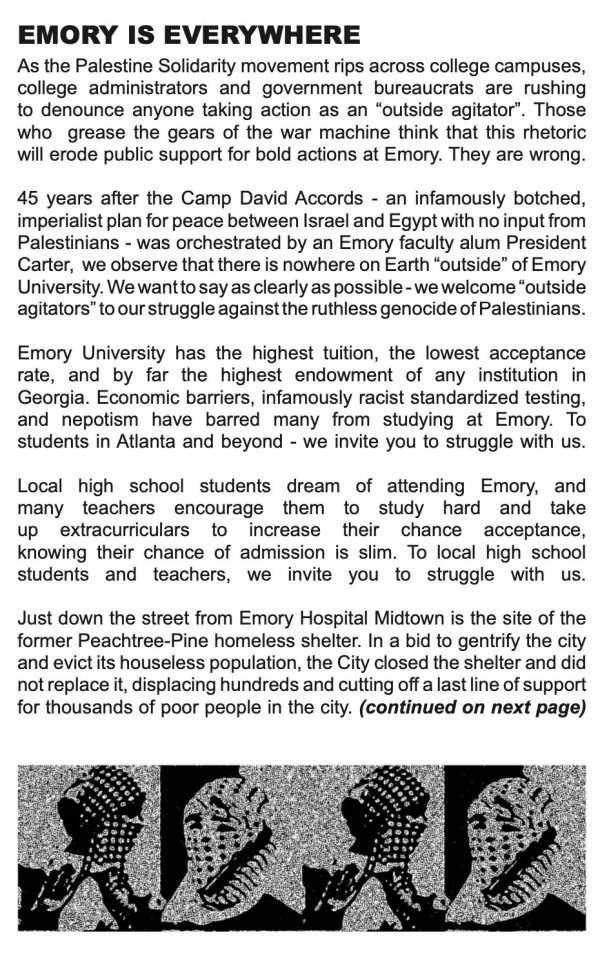
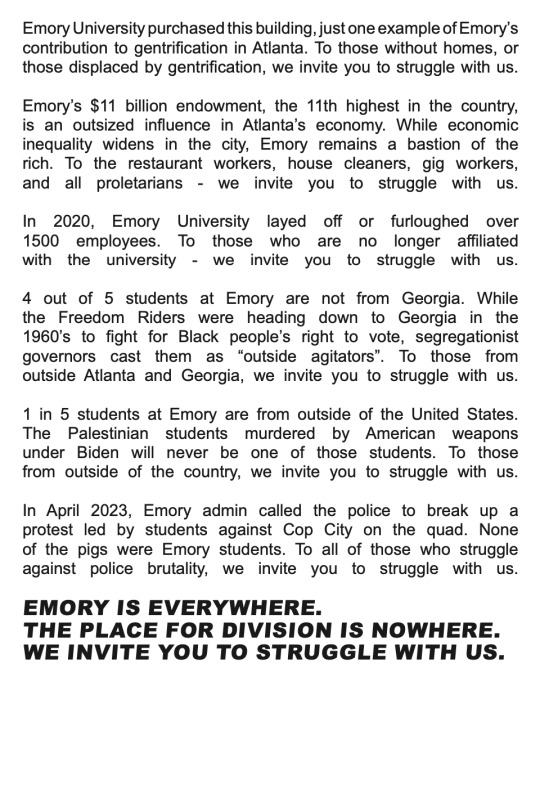
As the Palestine Solidarity movement rips across college campuses, college administrators and government bureaucrats are rushing to denounce anyone taking action as an “outside agitator”. Those who grease the gears of the war machine think that this rhetoric will erode public support for bold actions at Emory. They are wrong. 45 years after the Camp David Accords - an infamously botched, imperialist plan for peace between Israel and Egypt with no input from Palestinians - was orchestrated by an Emory faculty alum President Carter, we observe that there is nowhere on Earth “outside” of Emory University. We want to say as clearly as possible - we welcome “outside agitators” to our struggle against the ruthless genocide of Palestinians. Emory University has the highest tuition, the lowest acceptance rate, and by far the highest endowment of any institution in Georgia. Economic barriers, infamously racist standardized testing, and nepotism have barred many from studying at Emory. To students in Atlanta and beyond - we invite you to struggle with us. Local high school students dream of attending Emory, and many teachers encourage them to study hard and take up extracurriculars to increase their chance acceptance, knowing their chance of admission is slim. To local high school students and teachers, we invite you to struggle with us. Just down the street from Emory Hospital Midtown is the site of the former Peachtree-Pine homeless shelter. In a bid to gentrify the city and evict its houseless population, the City closed the shelter and did not replace it, displacing hundreds and cutting off a last line of support for thousands of poor people in the city. Emory University purchased this building, just one example of Emory’s contribution to gentrification in Atlanta. To those without homes, or those displaced by gentrification, we invite you to struggle with us. Emory’s $11 billion endowment, the 11th highest in the country, is an outsized influence in Atlanta’s economy. While economic inequality widens in the city, Emory remains a bastion of the rich. To the restaurant workers, house cleaners, gig workers, and all proletarians - we invite you to struggle with us. In 2020, Emory University laied off or furloughed over 1500 employees. To those who are no longer affiliated with the university - we invite you to struggle with us. 4 out of 5 students at Emory are not from Georgia. While the Freedom Riders were heading down to Georgia in the 1960’s to fight for Black people’s right to vote, segregationist governors cast them as “outside agitators”. To those from outside Atlanta and Georgia, we invite you to struggle with us. 1 in 5 students at Emory are from outside of the United States. The Palestinian students murdered by American weapons under Biden will never be one of those students. To those from outside of the country, we invite you to struggle with us. In April 2023, Emory admin called the police to break up a protest led by students against Cop City on the quad. None of the pigs were Emory students. To all of those who struggle against police brutality, we invite you to struggle with us. EMORY IS EVERYWHERE. THE PLACE FOR DIVISION IS NOWHERE. WE INVITE YOU TO STRUGGLE WITH US.
135 notes
·
View notes
Text
50 Times US Conservatives Were on the Wrong Side of History
As you read this post, keep in mind today's Conservative moments hold all the same views. We are actively seeing them rolling back many of these movements in real time.
Slavery (Before the Civil War) – Southern conservatives staunchly defended slavery as a vital part of the economy and way of life.
The Civil War (1861-1865) – Conservatives in the South fought to preserve slavery, leading to a bloody conflict that devastated the nation.
Reconstruction (1865-1877) – Southern conservatives resisted Reconstruction efforts to grant rights and protections to freed slaves.
Jim Crow Laws (Late 1800s-1960s) – Southern conservatives fought to maintain racial segregation and disenfranchise Black Americans.
The Women's Suffrage Movement (Late 1800s-1920) – Conservative politicians and groups actively opposed women's right to vote.
The New Deal (1930s) – Conservative elites opposed Franklin Roosevelt’s New Deal programs, which sought to alleviate poverty and economic inequality during the Great Depression.
The Civil Rights Act of 1964 – Many conservative Southern politicians opposed this landmark legislation to end racial segregation and discrimination.
Voting Rights Act of 1965 – Conservative lawmakers opposed this bill, which aimed to eliminate racial discrimination in voting practices.
Brown v. Board of Education (1954) – Conservative politicians and groups in the South opposed the Supreme Court decision that declared racial segregation in public schools unconstitutional.
Desegregation of Public Schools (1950s-1960s) – Southern conservatives resisted federally mandated school desegregation.
The Equal Rights Amendment (1970s) – Conservative groups, such as the “STOP ERA” campaign, fought against equal rights for women, fearing the ERA would undermine traditional gender roles.
The Fight for LGBTQ+ Rights (Late 20th Century-Present) – Conservative groups have long opposed LGBTQ+ rights, including the fight for marriage equality.
Roe v. Wade (1973) – Conservatives, particularly religious groups, staunchly opposed a woman’s right to choose abortion.
Desegregation Busing (1970s) – Conservative politicians and parents opposed busing programs designed to integrate public schools.
The Vietnam War (1955-1975) – Many conservatives supported the war, which ultimately became widely seen as a failure and a quagmire that led to significant loss of life.
The Fight for Minimum Wage Increases – Conservative politicians have repeatedly opposed efforts to raise the federal minimum wage.
The Fight for Healthcare Reform – Conservative opposition to healthcare reforms such as the Affordable Care Act (Obamacare) has been widespread, arguing against universal healthcare solutions.
The Fair Housing Act (1968) – Southern conservatives opposed the Fair Housing Act, which aimed to eliminate discrimination in housing practices.
Social Security (1935) – Conservative figures opposed the creation of Social Security, a key part of the American welfare system.
Unions and Labor Rights – Conservative forces have historically opposed labor unions and workers' rights, fighting against collective bargaining and labor protections.
Women's Reproductive Rights – Beyond Roe v. Wade, conservatives have opposed various efforts to expand reproductive rights and healthcare access.
Opposition to the Affordable Care Act (2010) – Conservative groups strongly opposed the ACA, claiming it was too costly and that it represented an overreach of government power.
The Fight for Immigrant Rights – Conservatives have historically supported harsh immigration policies, including the criminalization of undocumented immigrants.
The Fight for Environmental Protection – Conservative groups have often downplayed the importance of environmental protections and climate change action, opposing measures to regulate pollution.
The LGBTQ+ Military Ban – Conservatives in the 1990s supported the "Don't Ask, Don't Tell" policy, which restricted openly LGBTQ+ individuals from serving in the military.
The War on Drugs – Conservative policies contributed to mass incarceration, disproportionately affecting Black and Latino communities, without addressing the root causes of drug addiction.
The Fight for Marriage Equality – Conservative figures and groups consistently opposed same-sex marriage, including a federal ban that was eventually overturned by the Supreme Court.
Opposition to Public Health Measures – During the COVID-19 pandemic, conservative politicians downplayed public health guidelines, including wearing masks and social distancing, resulting in higher rates of transmission and death.
The GI Bill (1944) – While the bill benefited millions of veterans, conservative opposition in some areas limited access for Black veterans.
The Civil Rights Movement (1950s-1960s) – Conservative politicians and law enforcement were often hostile to civil rights leaders and protests, including opposition to Martin Luther King Jr. and the March on Washington.
Opposition to the Equal Pay Act (1963) – Conservative figures initially opposed equal pay legislation for women, arguing it would interfere with market forces.
The Fight for Workers' Rights – Conservatives frequently oppose stronger labor protections, such as paid sick leave and vacation days.
The Immigration Act of 1965 – Conservative figures fought against the Immigration and Nationality Act, which removed racially discriminatory quotas in U.S. immigration law.
The American with Disabilities Act (1990) – Conservative politicians opposed the ADA, which required accessibility and anti-discrimination protections for disabled individuals.
The Fair Labor Standards Act – Many conservative leaders fought against the legislation that set minimum wage laws and restrictions on child labor.
The Equal Education Opportunity Act – Conservatives have often resisted efforts to provide equal educational opportunities for students of color and students with disabilities.
Opposition to Gun Control – Conservative gun-rights groups and politicians have opposed various gun control measures, even in the face of increasing gun violence.
Opposition to Federal Civil Rights Laws – Conservative Southern Democrats and Republicans historically fought against federal civil rights legislation, including the Civil Rights Act and Voting Rights Act.
The Family and Medical Leave Act (1993) – Conservative lawmakers were opposed to the idea of paid family leave and medical leave programs.
The Immigration Reform and Control Act (1986) – Although this was a compromise bill, conservative opposition to more comprehensive immigration reform has persisted.
The Clean Water Act (1972) – Conservatives resisted environmental protections for water systems, which led to more pollution and harmful practices for public health.
The Clean Air Act – Conservative opposition to the regulation of air pollution and emissions has undermined efforts to protect public health and the environment.
Efforts to Address Climate Change – Conservative skepticism about climate science has led to inaction on reducing carbon emissions and transitioning to renewable energy.
The War on Women’s Health – Conservative policies aimed at restricting women’s access to contraception, abortion, and reproductive health services have been widely criticized.
Civil Rights for Indigenous Peoples – Conservative opposition to Native American land rights and sovereignty has led to continued struggles for indigenous communities.
The Fairness Doctrine – Conservative media figures fought the repeal of the Fairness Doctrine in the 1980s, which allowed for more partisan and biased media coverage.
Opposition to Immigration Reform (2000s-Present) – Conservative politicians have opposed comprehensive immigration reform, often focusing on border security rather than addressing root causes or offering a path to citizenship.
Opposition to Scientific Research on Gun Violence – Conservatives have historically blocked research into gun violence and its causes, impeding evidence-based policy solutions.
Opposition to Universal Basic Income – Conservatives have resisted proposals for UBI, fearing that it might incentivize laziness and undermine capitalism.
Opposition to Reparations for Slavery – Many conservatives oppose reparations for African Americans as compensation for slavery and the ongoing impacts of systemic racism, arguing that it’s impractical or unfair.
There is not a single Fascist government in all of history who didn't make economic progress on the backs of mass repressions and/or murder.
This is the moment we are at in history.
The mass of men lead lives of quiet desperation. - Henry David Thoreau
How will history remember you? Will history remember you?
#dark-rx#donald trump#trump#trump administration#fuck trump#fuck musk#elon musk#musk#nazilism#president musk#president trump#trump 2024#trump is a threat to democracy#anti trump#traitor trump#trump is the enemy of the people
46 notes
·
View notes
Text
आर्थिक विषमता को दूर करने Maharashtra से चप्पलों में चले Arun Pangarkar,...
youtube
Economic communism is the only solution to poverty alleviation.
#movements against economical inequality#Economic communism is the only solution to poverty alleviation.#Youtube
0 notes
Text
Aug 2, 2018 by Henry Giroux
The nightmares that have shaped the past and await return slightly just below the surface of American society are poised to wreak havoc on us again. America has reached a distinctive crossroads in which the principles and practices of a fascist past and neoliberal present have merged to produce what Philip Roth once called “the terror of the unforeseen.” Since the 1970s, American society has lived with the curse of neoliberalism, or what can be called the latest and most extreme stage of predatory capitalism. As part of a broader comprehensive design, neoliberalism’s overriding goal is to consolidate power in the hands of the financial elite. As a mode of rationality, it functions pedagogically in multiple cultural sites to ensure no alternatives to its mode of governance can be imagined or constructed
[ ... ]
Neoliberalism’s hatred of democracy, the common good and the social contract has unleashed generic elements of a fascist past in which white supremacy, ultra-nationalism, rabid misogyny and immigrant fervor come together in a toxic mix of militarism, state violence and the politics of disposability. Modes of fascist expression adapt variously to different political historical contexts assuring racial apartheid-like forms in the postbellum U.S. and overt encampments and extermination in Nazi Germany. Fascism—with its unquestioning belief in obedience to a powerful strongman, violence as a form of political purification, hatred as an act of patriotism, racial and ethnic cleansing, and the superiority of a select ethnic or national group—has resurfaced in the United States. In this mix of economic barbarism, political nihilism, racial purity, economic orthodoxy and ethical somnambulance, a distinctive economic-political formation has been produced that I term neoliberal fascism.
a few more prescient highlights from this very long but absolutely incredible, clear eyed and well sourced article from 7 years ago below the cut.
Under these accelerated circumstances, neoliberalism and fascism conjoin and advance in a comfortable and mutually compatible movement that connects the worst excesses of capitalism with authoritarian “strongman” ideals—the veneration of war, a hatred of reason and truth; a celebration of ultra-nationalism and racial purity; the suppression of freedom and dissent; a culture that promotes lies, spectacles, scapegoating the other, a deteriorating discourse, brutal violence, and, ultimately, the eruption of state violence in heterogeneous forms. In the Trump administration, neoliberal fascism is on steroids and represents a fusion of the worst dimensions and excesses of gangster capitalism with the fascist ideals of white nationalism and racial supremacy associated with the horrors of the past. 7 Neoliberal structural transformation has undermined and refigured “the principles, practices, cultures, subjects and institution of democracy understood as rule by the people.”8 Since the earlier ’70s, the neoliberal project has mutated into a revolt against human rights and democracy and created a powerful narrative that refigures freedom and authority so as to legitimize and produce massive inequities in wealth and power.9 Its practices of offshoring, restructuring everything according to the dictates of profit margins, slashing progressive taxation, eliminating corporate regulations, allowing unchecked privatization and the ongoing commercializing of all social interactions “inflicts alienating misery” on a polity newly vulnerable to fascist ideals, rhetoric and politically extremist movements.10 Furthermore, the merging of neoliberalism and fascism has accelerated as civic culture is eroded, notions of shared citizenship and responsibility disappear, and reason and informed judgment are replaced by the forces of civic illiteracy. State-sanctioned attacks on the truth, facts and scientific reason in Trump’s America are camouflaged as one would expect when led by the first reality TV president—by a corporate-controlled culture of vulgarity that merges celebrity culture with a nonstop spectacle of violence. Neoliberalism strips democracy of any substance by promoting an irrational belief in the ability of the market to solve all social problems and shape all aspects of society. This shift from a market economy to a market-driven society has been accompanied by a savage attack on equality, the social contract and social provisions as wages have been gutted, pensions destroyed, health care put out of reach for millions, job security undermined, and access to crucial public goods such as public and higher education considerably weakened for the lower and middle classes. In the current historical moment, neoliberalism represents more than a form of hyper-capitalism, it also denotes the death of democracy if not politics itself.
[ ... ]
What is often labeled as an economic crisis in American society is also a crisis of morality, sociality and community. Since the 1970s, increasing unregulated capitalism has hardened into a form of market fundamentalism that has accelerated the hollowing out of democracy through its capacity to reshape the commanding political, social and economic institutions of American society, making it vulnerable to the fascist solutions proposed by Trump. As an integrated system of structures, ideologies and values, neoliberalism economizes every aspect of life, separates economic activity from social costs, and depoliticizes the public through corporate-controlled disimagination machines that trade in post-truth narratives, enshrine the spectacle of violence, debase language and distort history. Neoliberalism now wages a battle against any viable notion of the social contract, solidarity, the collective imagination, the public good and the institutions that support them. As the realm of the political is defined in strictly economic terms, the institutions, public goods, formative cultures and modes of identity essential to a democracy disappear, along with the informed citizens necessary to sustain them.
[ ... ]
While it is true the U.S. may not be putting millions in gas chambers or promoting genocide, there remain reworked elements of the past in the present. For instance, there are already echoes of the past in existing and expanding infrastructures of punishment—amounting to a carceral state—that have grown exponentially in the past four decades. In fact, the United States has the largest prison system in the world, with more than 2.5 million people incarcerated. Astonishingly, this figure does not include immigrant detention centers and other forms of encampment around the U.S. border with Mexico. The visibility of this state-sanctioned punishing apparatus and its similarity to a fascist history was on display recently with the caging of young immigrant children who were forcibly separated from their parents at the southern border for months at a time. Needless to say, such institutions and actions resonate with deeply disturbing events of a dark past for which the violent separation of families was a hallmark feature of fascist brutality.
25 notes
·
View notes
Text
The glow of the tech bros’ halo is dimming and, in 2025, the computing industry’s sheen of glamor will continue to fade too. While other STEM fields are making strides in broadening participation in their workforces, year after year, computing, a supposedly innovative field, fails to recruit, retain, and respect women and nonbinary workers. For example, precision questioning, abstraction, aggression, sexism, and a disdain for altruism—serving the social good—are a few of the core values driving culture in computing worksites. These values and the ways they are policed via bias, discrimination, and harassment in high-tech companies form the “Bro Code.”
The Bro Code perpetuates high tolerance of sexual harassment. It also contributes to the field’s failure to rectify its stark segregation. Only 21 percent of computer programming positions are held by women. Of that 21 percent, only 2 percent are African American, and only 1 percent are Latina. While sorely underrepresented in the field overall, women are disproportionately affected during industry’s downsizing. For example, nearly 70 percent of those laid off in the 2022 tech layoffs were women. This tracks with my experience in Big Tech. As soon as the company went public, stockholders demanded annual layoffs. For the first two years, the only people terminated in my department were women.
Further, due to their massive wealth and masterful branding, Bro Code bosses believe themselves to be wizards or priests. They lean into authoritarianism, prompted to repress complaints and resistance. Some programmers imitate this behavior. For example, in 2023, tech bros mobbed the Grace Hopper Celebration, the world’s largest conference for women and nonbinary tech workers. Women attendees I spoke with described men at the career expo simply barging in front of them in lines, and some said they were verbally harassed and assaulted.
In 2025, the march toward a future dictated by algorithmic lords will falter. Coalitions between feminist movements and labor activism will increase public scrutiny of tech culture. These efforts will start to crack the Bro Code. Bro Code bosses talk a big game about its socially revolutionary impact, but participants in my research felt thwarted when trying to use their technical skills to serve others. For instance, Lynn reported that the eye-tracking device she developed to help people with disabilities was repurposed for marketing analysis; Shauna’s lab mates nicknamed her “accessibility bitch” when she worked on projects to help those disenfranchised in computing.
As Big Tech continues to deliver empty promises instead of solutions to social ills—while dodging taxes, quashing regulations and fueling a yawning pay inequality gap—the public will continue to grow disenchanted with the industry. In 2025, thwarted altruistic efforts like Shauna’s and Lynn’s will accelerate growing skepticism about computing’s service to humanity.
Disenfranchised tech workers will continue to help us hold Bro Code bosses accountable for not only failing to live up to its widely publicized altruism, but also for their efforts to conceal the social harms of their products. As recent organizing activities by tech workers show, strong coalitions across workers are what scare these reigning elites the most. For example, in 2018, more than 20,000 Google employees across the globe staged a walkout against sexual harassment and systemic racism in the company. In 2025, activism against the militarization, racism, sexism and economic exploitation in the tech industry will skyrocket higher than Bro Code bosses' space jets.
28 notes
·
View notes
Note
Is there any way for governments to respond to a pandemic such as Covid 19 or something worse without provoking considerable public resentment? Take no measures to prevent the spread and you’ll be blamed for the resulting public health disaster. Try to prevent the spread, and you’ll be blamed for the inevitable inequities and negative effects taken to do so, and the (mitigated, but not entirely avoided) public health disaster.
I don't mean this to come off as pessimistic or overly negative, but I would say as a matter of historic record, public health campaigns (especially anti-pandemic campaigns) tend to be quite unpopular - and my suspicion is that the mid-20th century moment where public health experts like Jonas Salk and Albert Sabin became folk heroes with enormous amounts of popular support from the middle-class parents of the Baby Boom is probably the exception that proves the rule.

You can go all the way back to the very earliest days of public health measures - the Venetian invention of the quarantine during the Black Death - to find one of the first anti public-health backlashes. Conservative Venetians felt that the free food packages that were an essential part of the quarantine process (because you don't want potentially sick people wandering the city looking for food) would make people lazy and economically dependent on the government.
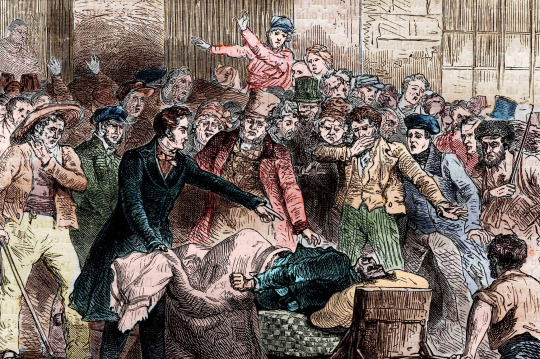
Likewise, when advances in medicine and state capacity in the early 19th century led to one of the first modern pandemic campaigns during the cholera outbreaks of the early 1830s, the public's response was not one of orderly compliance and gratefulness. Instead, you had what were called the "cholera riots" in both the U.K and Russia. Buoyed by conspiracy theories about shadowy cabals of doctors working hand in hand with an autocratic government to kill the destitute, mobs attacked symbols of public health (public hospitals, government doctors, public research clinics, anatomical colleges, health boards) and government authority (governors, police stations, quarantine cordons, court houses, etc.).
By contrast, all the anti-vaxx insanity of the past couple years seems a bit tame - at least in COVID-19, most violence has been rhetorical and abstract rather than involving the targeted murder of doctors and government officials.
Ultimately, we may just have to come to grips with the fact that public health/anti-pandemic policy is always going to be unpopular and that the correct approach is to use hard power rather than try to chivvy people into doing what's in their best interests. I certainly remember how California started to make strides against the anti-vaxx movement prior to COVID-19: it ultimately required legislation like SB 277 and SB 742 that made vaccinations more mandatory and made anti-vaxx harassment punishable with six months in jail.
155 notes
·
View notes
Text
AK Press made some of their e-books free for a little while. These are the free ones.

An exploration of how emergent strategies can help us meet this moment, survive what is to come, and shape safer and more just futures.
Practicing New Worlds explores how principles of emergence, adaptation, iteration, resilience, transformation, interdependence, decentralization and fractalization can shape organizing toward a world without the violence of surveillance, police, prisons, jails, or cages of any kind, in which we collectively have everything we need to survive and thrive.
Drawing on decades of experience as an abolitionist organizer, policy advocate, and litigator in movements for racial, gender, economic, and environmental justice and the principles articulated by adrienne maree brown in Emergent Strategy: Shaping Change, Changing Worlds, Ritchie invites us to think beyond traditional legislative and policy change to create more possibilities for survival and resistance in the midst of the ongoing catastrophes of racial capitalism—and the cataclysms to come. Rooted in analysis of current abolitionist practices and interviews with on-the-ground organizers resisting state violence, building networks to support people in need of abortion care, and nurturing organizations and convergences that can grow transformative cities and movements, Practicing New Worlds takes readers on a journey of learning, unlearning, experimentation, and imagination to dream the worlds we long for into being.
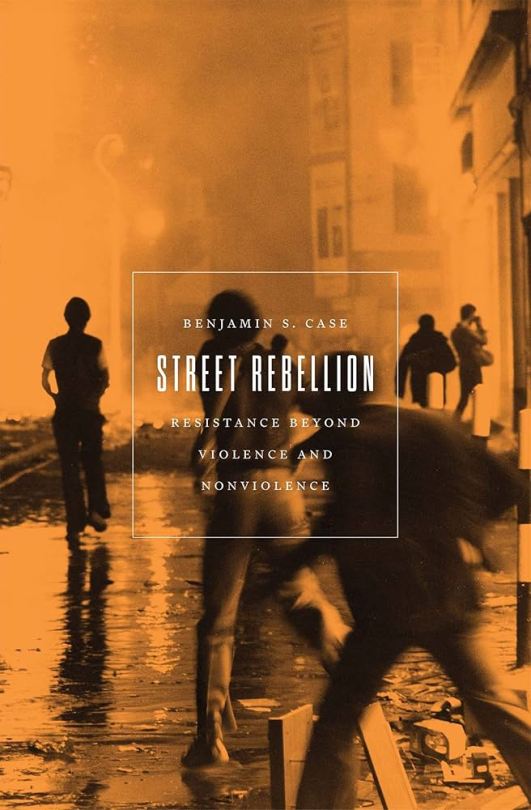
In a style that bridges the divide between academia and activism, Street Rebellion develops a broader and more accurate understanding of how people struggle for liberation.
We are living in a time of uprisings that routinely involve physical confrontation—burning vehicles, barricades, vandalism, and scuffles between protesters and authorities. Yet the Left has struggled to incorporate rioting into theories of change, remaining stuck in recurring debates over violence and nonviolence. Civil resistance studies have popularized the term “strategic nonviolence,” spreading the notion that violence is wholly counter-productive. Street Rebellion scrutinizes recent research and develops a broad and grounded portrait of the relationship between strategic nonviolence and rioting in the struggle for liberation.

¡No Pasarán! is an anthology of antifascist writing that takes up the fight against white supremacy and the far-right from multiple angles. From the history of antifascism to today's movement to identify, deplatform, and confront the right, and the ways an insurgent fascism is growing within capitalist democracies, a myriad of voices come together to shape the new face of antifascism in a moment of social and political flux.
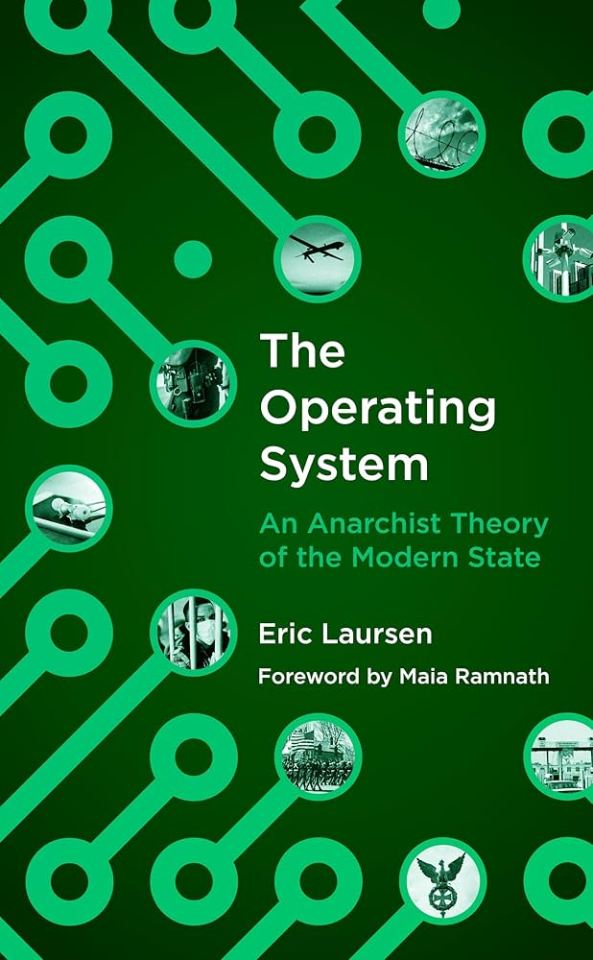
One of the most unique aspects of anarchism as a political philosophy is that it seeks to abolish the state. But what exactly is “the state”? The State is like a vast operating system for ordering and controlling relations among human society, the economy, and the natural world, analogous to a digital operating system like Windows or MacOS. Like a state, an operating system “governs” the programs and applications under it and networked with it, as well as, to some extent, the individuals who avail themselves of these tools and resources. No matter how different states seem on the surface they share core similarities, namely:
* The State is a relatively new thing in world history
* The State is European in origin and outlook
* States are “individuals” in the eyes of the law
* The State claims the right to determine who is a person
* The State is an instrument of violence and war
* The State is above the law
* The State is first and foremost an economic endeavor
Anyone concerned with entrenched power, income inequality, lack of digital privacy, climate change, the amateurish response to COVID-19, or military-style policing will find eye-opening insights into how states operate and build more power for themselves—at our expense. The state won’t solve our most pressing problems, so why do we obey? It’s time to think outside the state.

Joyful Militancy investigates how fear, self-righteousness, and moralism infiltrate and take root within liberation movements, what to do about them, and ultimately how tenderness and vulnerability can thrive alongside fierce militant commitment.
Why do radical movements and spaces sometimes feel laden with fear, anxiety, suspicion, self-righteousness, and competition? Montgomery and bergman call this phenomenon rigid radicalism: congealed and toxic ways of relating that have seeped into social movements, posing as the “correct” way of being radical. In conversation with organizers and intellectuals from a wide variety of political currents, the authors explore how rigid radicalism smuggles itself into radical spaces, and how it is being undone
Interviewees include Silvia Federici, adrienne maree brown, Marina Sitrin, Gustavo Esteva, Leanne Betasamosake Simpson, Walidah Imarisha, Margaret Killjoy, Glen Coulthard, Richard Day, and more.

Self-help, society-help, and planet-help to shape the futures we want. A resolutely materialist spirituality based equally on science and science fiction: a wild feminist and afro-futurist ride!
Inspired by Octavia Butler's explorations of our human relationship to change, Emergent Strategy is radical self-help, society-help, and planet-help designed to shape the futures we want to live. Change is constant. The world is in a continual state of flux. It is a stream of ever-mutating, emergent patterns. Rather than steel ourselves against such change, this book invites us to feel, map, assess, and learn from the swirling patterns around us in order to better understand and influence them as they happen. This is a resolutely materialist “spirituality” based equally on science and science fiction, a visionary incantation to transform that which ultimately transforms us.
20 notes
·
View notes
Text
The thing is, if the big criticisms of Zionism that offend people, are like mentions of racial and economic inequality, failed democracy, or generic comparisons to apartheid, we all know the solution would be to stop doing the things people are criticizing.
"it's not apartheid! we just have a giant wall to prevent suicide bombers, and the numbers of suicide bombings went down as a result! We're also culturally sensitive, the bomb detecting dogs at the checkpoints are hidden from view!" [Please note I have met, in person, the architect of the wall along the west bank and I am essentially paraphrasing him here.]
okay so, hear me out!: what if you prevented suicide bombers by ensuring stable employment, healthcare access, good public education, allowed for freedom of movement, didn't build huge walls across farmlands, stopped evicting people from their homes, what if you didn't created tiered systems of civic access and policing, and also let their local governments manage/steward necessary public resources instead of like, cutting water or electricity or something? What if you met the needs they are agitating for, the needs which, when denied, make people easier to radicalize?
What if you made violence seem totally undesirable because their lives were good and prosperous and stable? Their children untraumatized?
...no? You can't systemically better the lives of the people on this land? "Well if we're nice, they take advantage and attack," ok so you will be stuck in a cycle of violence forever. Have you never had a sibling? It's no longer about who "started it," it's about who will end it. "They unfairly criticize when we protect ourselves!" If Israel only ever destroyed incoming missiles or rockets/protected themselves against aggressive attacks, I think the global stage would have a lot less to criticize, actually! But we all know that Israel does more than just defend itself and its people.
Escalations, retaliations, and vengeance never brings anyone back from the dead and never fixes the wounds caused. Too many people see someone else committing a moral wrong as an excuse for them to do the same because being a good person in response to atrocity/bad people feels unfair and difficult, and because it doesn't satisfy their anger and fear.
Unfortunately if a bad person hurts your community because of their feelings of disenfranchisement/anger/sense of justice, and in response you decide to be a bad person to their community out of a sense of justice for your people, now we just have two bad people doing bad things and a lot of dead civilians.
82 notes
·
View notes
Text
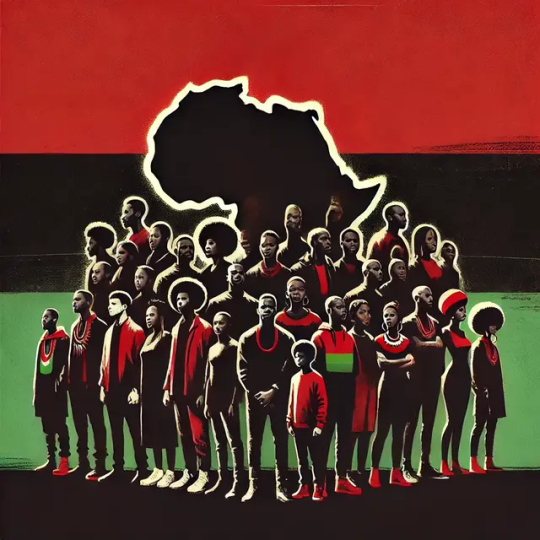
Diaspora Wars: A Garveyite Perspective on Why They Are Harmful, Counterproductive, and Unintelligent
From a Garveyite perspective, the so-called "Diaspora Wars"—the conflicts and divisions between Black people from different regions, including Africans, African Americans, Caribbeans, and Afro-Latinos—are one of the greatest obstacles to Black liberation. These internal conflicts are harmful, counterproductive, and completely unintelligent because they weaken Pan-African unity, make Black people easier to exploit, and distract from real issues like economic independence, nation-building, and global Black empowerment.
Marcus Garvey’s vision of Pan-Africanism was based on the idea that all Black people—regardless of where they were born—belong to one global African family and must work together to build a united Black world. Divisions based on nationality, culture, or colonial differences only serve white supremacy and prevent Black people from achieving true power.
This analysis will explore:
The origins of diaspora wars and why they were created to divide Black people.
Why diaspora conflicts benefit white supremacy and prevent Black progress.
The historical unity of Africans, African Americans, Caribbeans, and Afro-Latinos in resistance movements.
Why diaspora wars are based on misinformation and colonial brainwashing.
How Garveyism provides the only real solution to ending these divisions and building Black unity.
1. The Origins of Diaspora Wars: Divide and Conquer
A. Colonialism and Slavery Separated Black People on Purpose
The African diaspora exists because of slavery, colonialism, and forced migration, yet instead of seeing a shared struggle, many Black people have been programmed to see differences rather than commonality.
European colonizers and enslavers deliberately divided Black people by language, nationality, and region to prevent unity and resistance.
Black people were indoctrinated to believe that their struggles were unique and separate, rather than part of the same global fight against oppression.
Example: After slavery, Black Caribbeans were told that they were superior to African Americans because they were educated under the British system, while African Americans were told that Caribbean immigrants were outsiders taking their jobs. Meanwhile, both groups suffered under racist laws and economic oppression.
Key Takeaway: The division between Black people was never natural—it was created by white colonial powers to keep Black people weak and disorganized.
B. Nationalism Without Pan-Africanism Leads to Division
Many Black people today hold strong national identities (Nigerian, Jamaican, Haitian, African American, etc.), but these identities are often based on colonial borders that were drawn by white European powers.
Some Black people take pride in their specific nationality but reject Pan-African unity, which weakens the global Black struggle.
White-dominated countries encourage immigrants from different Black regions to assimilate into Western nationalism, causing them to see their fellow Black people as “foreigners” rather than family.
Example: Many Black people in the U.S. identify as American first, rejecting their African or Caribbean roots, even though America was built on the enslavement and exploitation of their ancestors.
Key Takeaway: Colonial borders and national pride should never come before Pan-African unity and global Black power.
2. Why Diaspora Wars Benefit White Supremacy and Prevent Black Progress
A. Black People Fighting Each Other Keeps Them Distracted from the Real Enemy
Instead of focusing on white supremacy, economic inequality, and global anti-Black racism, many Black people waste time attacking each other over accents, food, culture, and nationality.
While Black people argue over who has the “better” culture, white elites continue to control the global economy, media, and political systems.
A divided race can not fight for reparations, sovereignty, or economic independence, which is exactly what white supremacy wants.
Example: Instead of organizing for global Black wealth and political power, Black people spend time arguing about who suffered more—Africans under colonial rule or African Americans under Jim Crow. Meanwhile, both groups are still economically oppressed today.
Key Takeaway: While Black people fight over differences, white supremacy continues to win.
B. White Media Fuels Diaspora Wars to Keep Black People Divided
Hollywood, social media, and mainstream news intentionally amplify stereotypes and conflicts between Black people from different regions to promote division.
Films and TV shows often misrepresent African, Caribbean, and African American cultures, creating hostility instead of understanding.
Many social media influencers and celebrities promote division for attention and clout, rather than encouraging unity.
Example: When an African or Caribbean immigrant becomes successful in America, the media often promotes the narrative that African Americans are “lazy”, even though systemic racism affects all Black people. This fuels resentment and deepens division.
Key Takeaway: The system profits from Black division and will always promote stereotypes that make Black people hate each other.
3. The Historical Unity of Africans, African Americans, Caribbeans, and Afro-Latinos in Resistance Movements
While diaspora wars exist today, history proves that Africans, African Americans, Caribbeans, and Afro-Latinos have always worked together to fight oppression.
A. Pan-African Unity in Liberation Struggles
Haitian Revolution (1791-1804): Enslaved Africans from different tribes and regions united to defeat the French and establish the first Black republic.
Marcus Garvey’s UNIA (1914-1940s): Garvey built a movement that united Black people from Africa, the Caribbean, and America under one vision of Black sovereignty.
Anti-Colonial Movements (1950s - 1970s): Black leaders like Kwame Nkrumah (Ghana) and Jomo Kenyatta (Kenya) worked with African Americans to support liberation movements.
Example: Malcolm X travelled to Africa and the Caribbean to build alliances, proving that Black liberation is a global struggle, not just a national one.
Key Takeaway: When Black people unite, they win. When they divide, they lose.
4. Why Diaspora Wars Are Based on Misinformation and Colonial Brainwashing
Many of the stereotypes and insults used in diaspora wars come from colonial lies.
A. Stereotypes About African Americans, Africans, and Caribbeans Are False
“African Americans are lazy.” → FALSE. African Americans built America through slavery and fought for civil rights against extreme white violence.
“Africans sold other Africans into slavery, so they are responsible for the slave trade.” → FALSE. The transatlantic slave trade was organized, financed, and expanded by Europeans. African leaders who resisted were killed or overthrown.
“Caribbeans and Africans don’t care about racism in America.” → FALSE. Black Caribbeans and Africans have fought for Black rights in the U.S. for generations (e.g., Stokely Carmichael, Shirley Chisholm).
Example: The entire concept of “ADOS” (American Descendants of Slavery) and other groups with a similar ideology are created to divide Black people, making them reject Pan-African unity and reparations for all Black people.
Key Takeaway: The enemy is not other Black people—the enemy is white supremacy, colonialism, and economic control.
5. How Garveyism Provides the Only Real Solution to Ending Diaspora Wars and Building Black Unity
Marcus Garvey’s message was simple: Black people, no matter where they are from, must unite as one global nation.
A. Black People Must Prioritize Race Over Nationality
Being African, Caribbean, or African American should never come before being Black first.
The only way to defeat white supremacy is through global Black unity and power.
B. Focus on Black Economics, Not Petty Arguments
Instead of fighting online, Black people should focus on building Black businesses, investing in Africa, and developing Black-led economies.
Final Takeaway: Diaspora wars are a waste of time—true power comes from global Black unity.
Conclusion: Black People Must Unite or Stay Divided and Weak
Garvey said it best:
“Africa for the Africans, those at home and those abroad.”
It’s time to end the foolishness.
#black history#black people#blacktumblr#black tumblr#black#pan africanism#black conscious#africa#black power#black empowering#african diaspora#black diaspora#diaspora wars#black unity#black community#Garveyism#marcus garvey#blog
50 notes
·
View notes